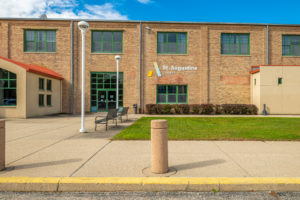Supporting Hispanic Communities Through Early Childhood Education

Why Bilingual Educators Are Essential in Early Childhood Settings
Hispanic families make up a growing portion of Chicago’s population, and many speak Spanish as their primary language at home. Yet, there remains a shortage of qualified bilingual teachers in the early childhood education workforce.
According to recent early childhood education workforce statistics, demand for culturally and linguistically responsive educators continues to rise, especially in urban centers like Chicago. Teachers who can educate young children in Spanish and English not only improve learning outcomes but also help children feel seen, understood, and supported.
St. Augustine College’s bilingual model prepares college students to do exactly that.
Addressing Hispanic Education Issues Starts Early
Educational inequities often begin before kindergarten. Factors like language barriers, limited access to preschool, and a lack of cultural representation in classrooms can hinder academic progress for Hispanic children.
By training future educators who understand these challenges firsthand, St. Augustine College’s Early Childhood Education program helps tackle these issues where it matters most, at the start of a child’s academic journey.
Students are empowered to create inclusive learning environments, with passionate professors and flexible courses that allow you to learn at your own pace, giving you the time needed to become the role model of tomorrow’s children.
A Curriculum Designed With Hispanic Educators in Mind
Whether you’re interested in the Associate of Applied Science in Early Childhood Education or a Bachelor of Arts degree, St. Augustine offers flexible, affordable pathways for aspiring Hispanic educators.
Courses are taught with a bilingual, student-centered approach, allowing students to build confidence in both English and Spanish. Practicum experiences connect students directly with classrooms that serve Spanish-speaking children, giving real-world experiences necessary for starting a career after graduation.
The college also collaborates with local Hispanic organizations, promoting education, strengthening students’ professional network,s and career opportunities.
Become Part of Chicago
If you’re passionate about early learning, community empowerment, and education equity, there’s never been a better time to step into the field of bilingual early childhood education.
By becoming one of the next generations of Hispanic educators, you can make a lasting impact on your community and help bridge the gap in access and achievement for young learners.




